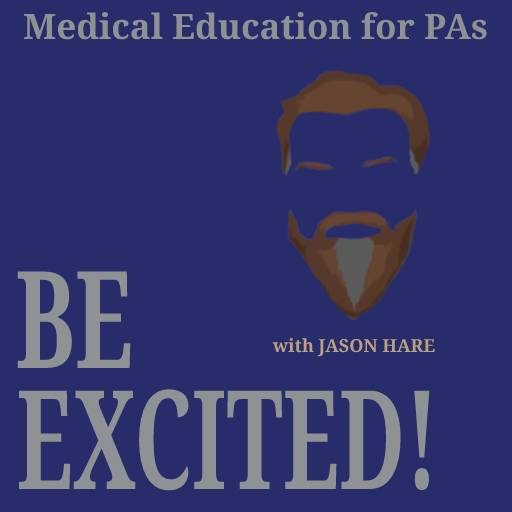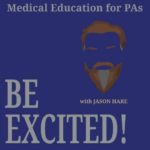
Professor Hare: [00:00:00] Hey there folks. This is Professor Hare and welcome to the Be Excited podcast coming to you from the Be Excited Retreat Center. This episode in our PA School Advising Track is the first of two episodes focused on the didactic year of PA school and surviving and thriving in that time. We will touch on the ways you can adjust your approach to PA school and the material that you will need to access.
Professor Hare: We will also discuss a few of the ways that you can use the PA school curriculum and timing to make your study most efficient. In the next episode, we will look at more tactics to aid you in your goal of becoming a rockstar PA. I will start with the caveat that not all tactics for studying and survival work for all students. And you may need to pick and choose or simply find your own best practices for studying as I will discuss, as we progress. PA school has a rapid pace and a limited time to access the significant amount of information you need to know [00:01:00] your approach to undergraduate courses may not work as well in the PA school curriculum.
Professor Hare: Approaching it with a good attitude and some insight into how you learn best will take you far.
Professor Hare: First and foremost, identify yourself as a good student with high standards, hungry to learn and a future expert in your field. If you’ve been admitted into a PA program, it is more than a fair bet that you are in the top 5% of applicants to these highly competitive programs. Remember that you were selected for a reason and keep that in mind as you work your way through PA school, identify yourself as someone who has an incredible amount of potential, much of it untapped.
Professor Hare: And also as someone who is willing to do the work to make that happen,
Professor Hare: identifying yourself as this person is crucial to making it happen. Let’s start with resources. Almost all PA programs are going to have well delineated objectives, whether this is a program mission statement, course objectives [00:02:00] for individual classes within the program, or the more granular learning objective.
Professor Hare: Keeping these in mind, as you work through content is one of the best ways to make sure you are studying what you need to study. It sounds simple, but knowing what you need to know is one of the biggest challenges facing grad students in general, and it certainly is true for PA students.
Professor Hare: Always make sure to back up to the lecture objectives, for any topic. If they are available to you, print them out or keep a copy on your desktop while studying that module, they’re designed specifically to provide you the student and also the accreditation commission with the focus of that lecture,
Professor Hare: especially in clinical medicine classes or problem-based learning classes, you will find, they can provide a lot of guidance if you use them. Note that some will be very specific. And in many programs they can get extremely focused on small areas, breaking the topics up.
Professor Hare: Other objectives may feel like boiler plate or common statements made for every topic. For [00:03:00] instance, choose the appropriate diagnostic studies. Or identify the signs and symptoms use these to guide your studying and ask yourself if you can check that box or not. The next question you should ask is what kind of resource material is best fit for me as a student and best fit for learning that particular area of medicine.
Professor Hare: Most PA faculty members want students to use varied resources, not just the content presented in class.
Professor Hare: Book resources, which are often found online as well, include general resources like Harrison’s Internal Medicine, Current Medical Diagnosis and Treatment, Tintinalli’s Emergency Medicine, Bates History and physical exam. There are many specialty reference materials like Hacker & Moore in obstetrics and gynecology or the DSM Five in psychiatry.
Professor Hare: Careful selection of books and resources can take you far. One thing you should avoid during the didactic or [00:04:00] first-year phase of PA school are books intended for PANCE board review books like PANCE Prep Pearls are good for some things, namely reviewing information that has already been learned for testing purposes, . Books like Pearls are not intended to be a student’s first, second, or even third exposure to a topic.
Professor Hare: And they are not a comprehensive look at any topic. Use review books when studying for PANCE or for review for recertification after the didactic year. And in most cases after the clinical year,
Professor Hare: Let’s move on to the fear of missing out or FOMO. Some PA students suffer from fear of missing out. Hearing from classmates that others are using various resources that they aren’t, maybe those other students are even doing well using all of those resources. This causes some students to feel as though they need to spread their knowledge gathering to five or six or more book resources.
Professor Hare: The problem? Every book assumes that it is essentially your only [00:05:00] resource on the topic. Reading all of the resources takes far too much time and skimming. All of them will cause you to miss details far better to ignore that nagging FOMO and find the few resources that speak to you and expand where you find it lacking. Resources like the Current series, Current Family Medicine, Current Pediatrics, Current Orthopedics to name just a few are more condensed and Harrison’s Internal Medicine has more explanations Tintinalli’s Emergency Medicine tends to be a more practical walk through the handling of a variety of conditions in a general setting.
Professor Hare: In this case, in the emergency department, the bottom line is to find the resources that speak to you and go with them in their entirety. Spreading out reading too many resources will dilute your knowledge, focus on only as many as you need. And don’t listen to classmates who tell you otherwise, of course, you will need to access the syllabus for the courses and the program in which you [00:06:00] are studying to understand what the required and recommended reference sources are for that particular program.
Professor Hare: Use caution in getting too far away from the required or recommended syllabus references, because those are more likely to be tested materials when exam time comes around.
Professor Hare: let’s talk about comfort level. This is something that I speak a great deal about with my students, and that is don’t spend a great deal of time studying things that you are already comfortable with. This is a form of confirmation bias that doesn’t expand your learning. You are simply rereading information that you have already learned.
Professor Hare: It doesn’t take very long to assess this confirmation bias or comfort level tendency skim the lecture objectives and make a note on each topic. That note, am I comfortable? Am I uncomfortable with this topic? Or am I simply neutral? Make a list of those topics and as hard and as discomforting as it might seem, [00:07:00] start with the topics you deem less easy first.
Professor Hare: Uneasy or dreading trying to learn something? Get after it early and with good focus, move on next to the neutral topics, then comfortable topics last, if at all, it may seem like a hard road at first, but it shortens your route to mastery and that makes it worthwhile.
Professor Hare: I can’t stress enough. If you are comfortable with a topic, then you probably know it fairly well. The ones that you aren’t comfortable with are the ones that you should get after
Professor Hare: next. Let’s talk about note-taking and review of those notes. Taking handwritten notes has been shown to be more effective or sticky in your mind when recall is attempted. That means you would be better off using pen and paper or a screen drawing application in some cases than typing into a notes field or a word document for some, this seems regressive again in order to be as efficient as possible during PA or grad [00:08:00] school taking notes is important.
Professor Hare: When a lecture myself included is rolling through a lot of content in the classroom, it is hard to take good notes that are clear. Your intent is often lost in the rush to get it all down. And when you go to look at it later on, your intent is often lost and comprehension and retention go out the window.
Professor Hare: The key to efficient use of your notes is to take five to 15 minutes at the end of class time or review of asynchronous video material time and review those notes.
Professor Hare: Don’t even leave the room. If you don’t have to sit and read through what you wrote or typed as notes by reviewing right away, you are far more likely to remember your intent and why you found those details important in your notes. You probably want to run to lunch or get home. Or go to the gym in those moments, but five to 10 minutes at that moment can save you time, frustration and add clarity later next. Let’s talk about [00:09:00] highlighting don’t waste time marking items for later, unless you take the time to revisit those marked up book pages or printed notes. Later on that time highlighting is wasted.
Professor Hare: It is a missed opportunity to get a good first or second pass on the information. PA school is a lot of information compressed into 24 to 28 months. This means that you can’t afford to waste a chance to learn information, marking it, to learn it later. If you’re going to mark things, learn them as you go, make sure that you’re paying attention to getting that information into your brain as you mark them.
Professor Hare: Be very selective with a few details you wish to collate or put into a chart. For instance, later on highlighting too often becomes a way of marking something to look at later on. And that time can be better spent learning it with a good pass at that information.
Professor Hare: Let’s talk about the ways in which studying can get a lot of information into your brain in a relatively short period of time. Using the [00:10:00] digestible bites theory helps us to understand that we can get a lot of information into our brains. If we use digestible bites, as opposed to a large amount of studying at one time, we call this bulk studying bulk studying or watching videos.
Professor Hare: One after the other for asynchronous content can get you into a mode where you’re not able to pay attention and learn new material after a period of time.
Professor Hare: Doing four hours of videos at once is almost guaranteed to cause you to zone out as is trying to sit and work through four or five lectures in one sitting smaller digestible bites and more frequent breaks at minimum may help here. Initially the arc of your attention drawn on a graph would go downhill to non-useful levels very quickly, often within 15 to 20 minutes.
Professor Hare: If you were to pay attention to the moment that your attention needs to be dragged back to the content and take a break in that moment and do anything else, take a walk, grab a piece of [00:11:00] chocolate as a reward. Pet your dog. Whatever then go back to studying with that same attention to losing focus. Students can build up the ability to study for hours at a time this way with practice, but don’t try to sit for hours at a clip, or you will not be able to absorb much and you will zone out another content digestion pointer has to do with the ability to get
Professor Hare: multiple passes on the information. As I like to tell my students use the neurophysiology to your advantage. My yearly quote to students in all of my courses is that quote, a previous synaptic transmission will make a repeated transmission, more likely causing a recall of information end quote. The example is the game memory in which the player has a deck of cards, which includes pairs of images and words.
Professor Hare: They are spread out over the table in an organized fashion. And the player starts to turn over the cards two at a time until they start to recognize the locations of the cards and can pick matches consistently. They are getting [00:12:00] multiple passes at this information, which in this case is the location of all of the cards in the deck.
Professor Hare: The more times they try and often fail the better they get at remembering. This happens in learning concepts in PA studies as well. If you learn something, once you are not likely to remember it, when needed, if you take a second pass at reading or otherwise being exposed to that information, you will consolidate the memory of that information, making it more likely to stick.
Professor Hare: Short term memories repeated five to 10 minutes later, are weakly consolidated into long-term memory
Professor Hare: and repetition an hour or more later causes a much stronger consolidation. And long-term stickiness of information is in process. Multiple passes is the key here and the timeframe helps a great deal. Multiple discreet episodes of recall cements information into long-term memory, A third pass at that information days, or even a week or more later will further solidify your ability to [00:13:00] remember information when it is important. So read or listen to it once review an hour or so later after turning your brain away from the topic, and then a few days to a week later, review it again.
Professor Hare: Not always possible, but this is an ideal scenario for efficient formation of memory in PA school. And in all areas of life, PA school is also set up to help you study and remember information in the way the multiple courses are often designed to discuss the same syndromes and diseases at the same time or close to the times other courses discuss their take on that condition.
Professor Hare: For instance, in my program, we discuss orthopedic presentation, diagnosis, and treatment in clinical medicine. At the same time procedures class is in the middle of setting fractures, applying splints and casts and joint injections down the hall. Later that afternoon history and physical exam class is teaching how to ask history questions and do special testing after a musculoskeletal injury.
Professor Hare: [00:14:00] Pharmacology is working on pain. Medications, surgery class is discussing sterile technique and surgical closure of wounds. All of these courses are talking about different things, but really They are providing different perspectives on the same conditions. This is another tried and true method for remembering details and concepts in medicine.
Professor Hare: If you look at the same problem from different angles, each pass is adding to your knowledge. And the common context of that area helps to make you a better practitioner when it’s all over.
Professor Hare: If you look at the same problem from different angles, each pass is adding to your knowledge. And the common context of that area helps to make you a better practitioner. After graduation.
Professor Hare: In this episode, we discuss the ways in which you can adjust your approach to PA school and the material that you will need to access and understand. We also discussed a few of the ways you can use the PA school curriculum and timing to make your study most efficient. In the next episode, we will have more study tips, ways to approach the [00:15:00] content and things to avoid during the didactic year of PA school.
Professor Hare: Hopefully this has been helpful. Be sure to check out the podcast website at beexcitedhq.com for more episodes, show notes and full transcripts of every show.
Professor Hare: Email us at [email protected] with questions, comments, and future show suggestions. And of course, follow us on Facebook and Instagram at be excited podcast for news, new episode notifications, and maybe a few pictures.
Thanks for listening…and Remain Excited!



